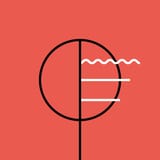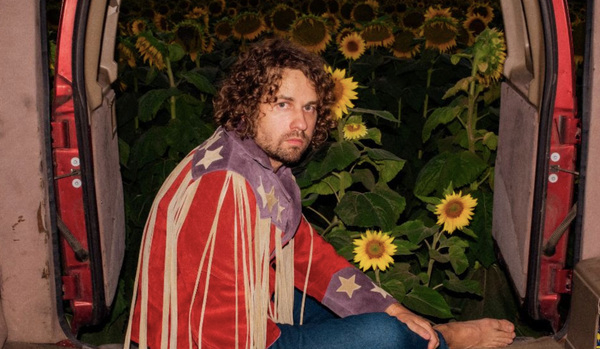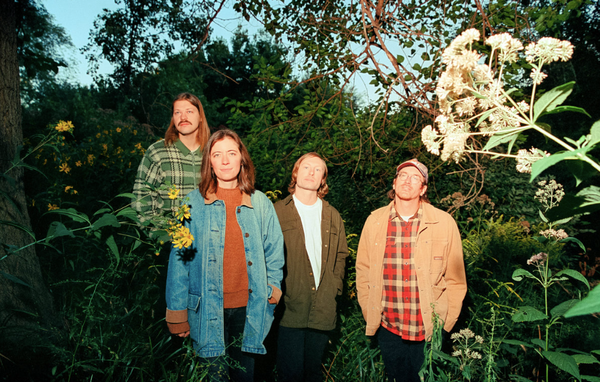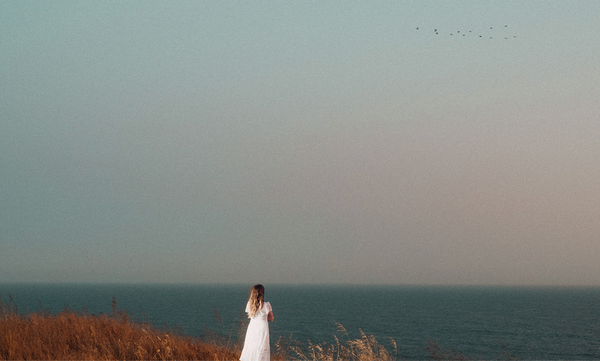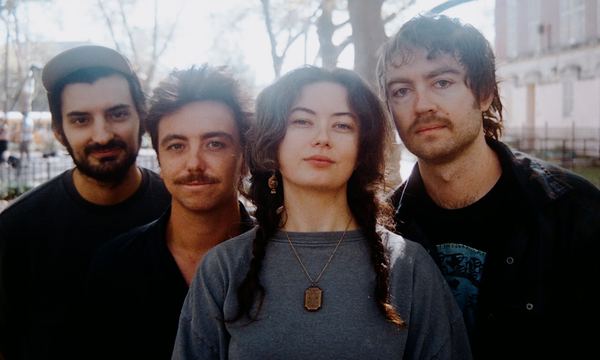In conversation with Vines' Cassie Wieland

There’s a piece of advice I read well over a decade ago now that has stayed with me. It was regarding listening to new music for the first time, and how it’s best to just look away from it, let it play out in the background. If a song or even just a moment in a song manages to reach out and grab you from that periphery, then you know there’s something there to dig into, to go back to.
Somewhat accidentally, this was how I made my way to Vines, the foggy, quietly cinematic project from composer and multi-instrumentalist Cassie Wieland. On a grey moody morning, like the seasons had silently shifted overnight, I had a few albums lined up to listen to and, selecting one at random, I went off wandering around my flat, unable to quite get a grip on the day. The music floated alongside me, winding through rooms, hovering just out of sight. By the time the closing track stirred and then bloomed into life I was transfixed. The shape and the weight of it felt singular and oddly moving, a skewed but compelling presence just over your shoulder, just out of sight.
That presence formed as Wieland’s debut album, I’ll be here, and it’s something of a masterstroke. Gently detailed but immensely powerful, it warps synths, percussion, strings alongside Cassie’s wavering voice, a vocoded apparition that drifts, recedes and occasionally breaks right through. There's a swallowing mood and tone that feels truly gripping, but perhaps its most striking aspect is the world-building that Wieland handles with real beauty. Shapes and shadows linger, half-held forms brush up against you as you listen. You might call them ghosts, many do.
The album was written and recorded in New York City, and it’s hard not to find yourself lost in its surrounding greyness, the aching sound of the isolation in a busy city, the brick walls and heavy weather, the fleeting lives passing by. Wieland lived there for a number of years, and wrote these songs at the desk of the job she eventually broke away from to complete the album and pursue music full time. Much of it was written and recorded at her home in Brooklyn, with further stints at Figure Eight Recording Studio and at the Greenpoint studio of the album’s co-producer, Mike Tierney. From the outset it feels like a New York record – because it mostly is one.
Wieland herself is no longer in Brooklyn, however. When we chat about the album she’s just moved upstate, to a new space she’s piecing together as a home. “I was in Brooklyn for seven years, so it's definitely different from that version of my life,” she tells me. “There's a reason people come up here. I've got a line of trees and hills through the window, right behind my computer. It's much nicer than the brick wall that I had before.”
Wieland actually grew up in central Illinois, in the Midwest, before moving to New York after completing her Master's Degree in composition, where she had to “study a lot of classical instrumental work”. This studying bred her fascination with texture and timber and also accidental sounds – the squeaks and creaks that fall into the ether when a human plays an instrument. These frayed edges, little notches in the fabric of sound she weaves, characterise her truly special debut album. Notes and songs heave and moan, the sound of figures wading through the fog.

Wrapped in ambient sound, the album feels ghostly and somewhat unnatural but it’s incredibly beautiful too. In fact, it feels somewhat deliberately pitched between those two worlds, and the result is somewhat confounding. “Texture has always been one of the most interesting aspects of music to me, whether it's intentionally written into a work or not,” Cassie says. “When somebody's playing and you hear those imperfections – something that sounds really handmade – I think you can sense underlying feelings rise to the surface. That's something that I am obsessed with. That's what I'm always trying to evoke.”
Some listeners see the results as dark and gloomy, while others find the opposite to be true. The album’s written introduction describes it as “resonant and open music, the kind that invites listeners in” while many of the album’s reviews mention the iciness, things shrouded and hidden inside a blanket of white noise. Two worlds at the same time.
“It's funny, because I get such different and disparate feedback on any song I write,” Wieland confirms. “My most popular song before this record was called ‘being loved isn't the same as being understood’ and people have told me how it’s so relaxing it helps them sleep every night. I’ve also been told that it’s the most depressing thing someone has ever heard! I think where you are in your life, how you feel about yourself…all these internal things are interacting with the music whenever you listen. So I think both are true,” she continues. “I think this album can be very shrouded and mysterious and foggy, but I think it also invites the listener to use that mystery to fill in the pieces themselves. I really like both.”
This dichotomy is present elsewhere. Cassie says the album feels less like a “bedroom record” to her and more like an “inside-my-body record”. “I think there's a big weird mixture of internal and environmental influences,” she says, “and that's why the record ended up so textural and shrouded.”
Those textures are manipulated and presented in various and fascinating ways across the album. After a smoldering start, ‘Evicted’ is the album’s bedrock, a five-and-a-half minute slow-crawl through muted beats and layered waves of noise that wrap themselves fully around Wieman’s splintered vocal. It’s heavy and mesmerising, and also the moment, production-wise, where the whole album began to take the shape that we find today. “That was the first song with lyrics that came to form,” Cassie explains. “I hesitated to start lyrics with this record, because I’m more confident in my instrumental composition abilities than I am my songwriting abilities. In fact, the lyrics for ‘Evicted’ were actually words that I wrote during one of the last days at my full time job. It felt like I just threw them up, in a way, but once we started getting going with that song I could begin to see the bigger picture, the beginning, middle and end.”
For all of the album’s instrumental heft, and despite those initial hesitations, it is perhaps the voice and lyrics that holds the whole thing together, gossamer-like strands that support the weight. “I definitely have to be in the right mindset for the writing to come out. I have to feel safe enough to get into that writing mindset,” Cassie admits. “At the time that I was writing the album, there were definitely a lot of emotional influences in my life, and I treated the writing of the record as a journal, just trying to let anything that needed to come out of me, come out.”
Those influences included that age-old battle between the head and the heart, of when to dive in and when to pull back. Working away at a full time office job, Cassie knew she really wanted to dedicate all of her time and energy into being a musician, while also grappling with the financial aspect of that, and also the internal voices that forever chatter away in the darker corners of the brain. “There was a lot of self-reckoning that I had to do before feeling brave enough to make that leap,” she says.
“Those emotional workings became a big part of this album. I remember that I had taken a day off of work to go to the dentist, because I had a sensitive tooth,” Cassie says, reflecting on that time. “It was super foggy and I felt like I was in a daze. I had all this emotional information; I knew that I needed to be somewhere else, and I knew I needed to do something about it, but I didn’t have the answers. That's where the line in ‘Tired’ came from: ‘A finger in my mouth to see if it still hurts’. That was the actual sensitive tooth I was going to the dentist for – but it’s also a metaphor: I have this information. I know that whenever I prod at it, it still hurts. I had to come to terms with the fact that I was never going to have the right answer, that it wasn’t going to be presented to me.”
Cassie was surrounded by musicians in her life, people who had made the leap and made it their job, but she had never seen anyone do it in quite the way she envisaged for herself. “At that time, I didn't see anybody doing exactly what I wanted to do, exactly how I wanted to do it and I felt discouraged by that, because I thought that meant that it wasn't possible,” she explains. “I felt like I didn't quite fit into the performance world, and I didn't quite fit into the composition world, either. I took it as a signal that it was not possible to exist in that middle ground. But I've learned otherwise since; I just had to realise that there wasn't always going to be a blueprint for me to follow.”
Those realisations stirred enough in Cassie for her to take a big stride forward into the process of making I’ll be here. She carried sketches and demos into the studio, and began to piece together the form of an album. Her and Mike would build on the ideas together and, as some defined scope began to take shape, friends came to provide other elements, a variety of additional instrumentation - saxophone, violin, cello, banjo – that Cassie would sample and then chop-up to be played with and placed, providing the album’s underlying heartbeat, all those wonderfully knotty textures.

Having laid the instrumental foundation, Cassie focused on the lyrics, trying to find ways of breaking through the emotional barrier she’d put up when it came to that incredibly personal practice. “It feels different – or at least it felt very different when I started doing it,” she says of writing the words that became these songs. “When I started writing lyrics I had to trick myself into doing it, which is why those first lyrics are very much journal entries. I think my relationship to words is very different to my relationship to music, though,” she adds. “I started writing music because I didn't know how to express myself with words, but the more I do it, the more I realise this is all the same thing. It all comes from the same place.”
The place that these songs came from is handled with care throughout her debut album. You can indeed hear the humanness of its imperfections amid the sheer emotional scope of the album she’s made. To paraphrase herself: you can sense underlying feelings rise to the surface. The result is something very special indeed, a justification for backing herself, proof that making the leap from a desk job to concentrate on this work full-time was worth all the effort it took to leap off.
“It feels like a relief, honestly,” Cassie says regarding the release of the album. “I think it's different every time but this one feels like a relief because I love this album, and I've been waiting for other people to have it. I felt like I've had it to myself for too long, and I am really excited to share it with people,” she continues. “My personal life has gone through a lot of transition leading up to, and throughout, the release. I just moved to this new place, and I’m navigating that and setting up my new studio, so I think this record really nicely marks the end of one journey and the beginning of another.
And I'm also really proud of it.
I'm really happy that people get to listen to it now.”
I'll be here is out now, buy/stream here
Vines performs at Basilica SoundScape in New York and Plantasia Chicago this September
